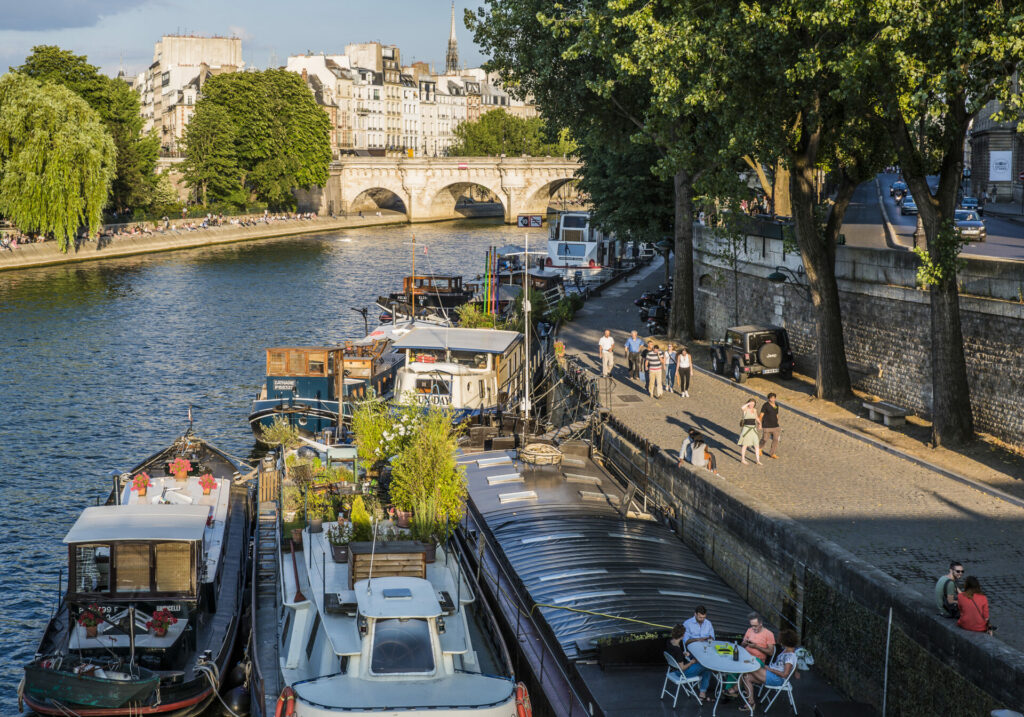At next year's Olympic Games, swimmers are scheduled to compete in the open waters of the Seine, a river with a century-long swim ban in place. French authorities are scrambling to make this a reality with a €1.5 billion plan for one of Europe's most damaged rivers.
"The Seine will be at the heart of the Paris 2024 project," the city's Deputy Mayor Pierre Rabadan said in a statement in April. "These cutting-edge Games will eventually allow for the opening of swimming sites for the general public from the summer of 2025."
In March, French President Emmanuel Macron assured that the clean-up works are "on the verge of succeeding", according to French television network TF1. However, the city's Deputy Mayor recently admitted that there is no "100% guarantee" that the river will be clean enough in time for the Olympics.
No Plan B in place
If heavy rain were to hit the French capital in the week before the Games, then the water quality would not be at the appropriate level, Deputy Mayor Pierre Rabadan explained to the New York Times.
Even so, the triathlon and open water swimming competitions are planned to take place in the Seine, in the area between the Eiffel Tower and the Invalides mausoleum, with no back-up location lined up.
The clean-up costing billions of euros targets two of the biggest active polluters: boats and sewers. Since 2018, the law has forbidden boats from dumping their discharge into the river, but as many ships are not adequately equipped to connect to the sewage system, the practice continues. In 2023, the government started providing grants of up to €6,000 for individual owners to upgrade their boats.

Model of an Olympic swimmer diving into the Seine. Credit: Paris 2024 Olympic Games
The works on the sewers are more complex and involve interventions in people's homes to fix the malfunctioning pipe system. The sewers and river are connected, with heavy rainfall pushing sewage into the river water. To fix this, more than 20,000 homeowners need to agree to have their pipes dug up and reconnected by summer 2024, the New York Times revealed.
Decades-old promise
The Seine clean-up was first promised in the 1990s, by former President and Paris mayor Jacques Chirac. The clean-up did not materialise but the Seine remained a Parisian icon. Its famed river banks in the city centre are listed as UNESCO World Heritage sites and throughout the warmer months of the year, they are brimming with life. Cyclists, joggers and pétanque players all gather on the banks, alongside Parisians and tourists who meet for a picnic or to share a bottle of wine by the Seine.
The waters have a different reputation, however. Water quality is worsened by boat discharge and sewage. A 2009 study found the waters to be contaminated with metals such as nickel as well as pesticides from previous industrial activity. In 2013, scientists estimated that up to 27 tons of plastic are collected from the waters each year. Worse still, it is not uncommon for human cadavers to be recovered from the water.
Dès 2025, vous pourrez vous baigner dans la #Seine 👍 Pour y parvenir, il est nécessaire de récupérer les eaux de pluie et leur infiltration dans les sols #ParisPluie 😉 ☔
👉 https://t.co/5uEn2U2p4Q pic.twitter.com/BfGdYguaLf — Paris (@Paris) October 22, 2018
Restoration efforts since the 2010s have brought some life back into the iconic waterway, notably through the return of many fish populations, like salmon. Yet, the river that inspired thousands of paintings and that turned Paris into a metropolis home to seven million people today remains "irreversibly artificial", a 2023 study published by UNESCO concludes.
Only time will tell whether the ambitious plans for the Olympics restore a landmark river that has been contaminated, severely modified for navigation and is also at constant risk of flooding the French capital.
Related News
- French pension protesters target 2024 Olympics with new disruption tactics
- Paris Pompidou art museum to close for five-year renovations
Brussels shares a similar history with its Senne River, except the health risks and degradation of the waterway prompted authorities to cover it up with concrete in the 19th century.
In its heyday, the Senne was not nearly as cherished as its Parisian counterpart and was covered up with no clean-up efforts. As recently as 2010, the river was "dead" and had no fish, The Guardian reported. In 2016, the first purification treatments started and the Belgian capital is now revisiting it, with works to uncover a part of the old river set to start this year.

